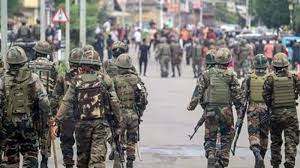Tension erupts in Manipur after ‘dispute’ over paddy field

Imphal, Manipur — June 16, 2025:
Tensions flared in Manipur on Sunday when a land dispute between two communities escalated into violent clashes. The fight occurred near the foothills of Kangpokpi district, where both Meitei and Kuki-Zo groups claimed ownership of the same paddy field.
Farmers from one group began plowing the disputed land in the morning. Members of the other community objected, arguing the field belonged to them. A heated argument followed. Within minutes, people from both sides began throwing stones and damaging equipment.
Eyewitnesses reported that some individuals fired shots into the air. Though no one died, at least four people suffered minor injuries. Security forces rushed to the spot and quickly brought the situation under control.
An Old Dispute, Rekindled
This was not the first time conflict arose over the same piece of land. Both communities have long claimed the area as their own. The lack of proper land records and unclear administrative boundaries have worsened the problem.
In recent years, demand for cultivable land has increased. As rainfall improves and more people return to farming, fallow lands are being reclaimed. This shift has created friction, especially where territorial claims overlap.
Experts say such disputes are common in Manipur’s hill-valley transition zones. For many, land is not just an economic resource. It holds cultural, historical, and emotional value.
Leaders Call for Calm
Soon after the clash, community leaders from both sides urged people to remain peaceful. They condemned the violence and warned against spreading rumors. Village elders and district officials held emergency meetings to ease the tension.
Kangpokpi Deputy Commissioner Thangjam Kameshwor assured the public that authorities were taking the situation seriously. “We’re working closely with local leaders to prevent further violence. Disputes like this must be resolved peacefully,” he said.
Women’s groups and local NGOs also stepped in. They visited affected families, offered aid, and urged unity. Their efforts reflect a growing grassroots push to prevent another wave of unrest in the region.
A Region Still Healing
Manipur is still recovering from the ethnic violence of 2023–24. That period saw hundreds killed and thousands displaced. Although relative peace has returned, fear and mistrust continue to linger.
Many observers believe the recent clash is a warning. It shows how fragile the current peace is and how quickly tensions can reignite.
“This is more than a land issue,” said Imphal-based sociologist Dr. Nengneithem Kipgen. “It’s about identity, trust, and the future. If we don’t address the root causes, small sparks will lead to big fires.”
Political Reactions and Policy Gaps
Manipur Chief Minister N. Biren Singh responded promptly. He appealed for calm and ordered extra security in the area. “There is no space for violence. The law will take its course,” he said.
Opposition leaders criticized the government for failing to prevent such conflicts. Congress leader K. Meghachandra said, “This reflects poor land governance. Without clear land rights, these clashes will keep happening.”
Analysts agree. Manipur lacks a comprehensive policy on land ownership, especially in areas where communities overlap. The state government had promised reforms, but progress has been slow.
Farmers Fear for Their Livelihood
For local farmers, the timing of the clash could not be worse. The monsoon season is approaching, and many had begun preparing their fields. Now, fear hangs over the region, and some farmers have abandoned their plots.
“We just want to work our land and feed our families,” said Khomdon, a farmer from a nearby village. “But every time we go to the field, we look over our shoulders.”
Many worry that if the issue is not resolved quickly, the planting season could suffer. That would lead to food shortages and economic losses in already struggling villages.
Authorities Take Preventive Measures
District officials have imposed Section 144 in the area. Public gatherings are banned, and extra police patrols are active. Officials are also reviewing revenue documents to assess the land’s legal status.
Talks between both groups are ongoing. Authorities have promised to act on verified records and ensure fair treatment for all.
Meanwhile, the state’s home department has asked for a report and may send more central forces if needed.
A Path Forward?
This incident highlights the urgent need for clear land laws, open dialogue, and conflict prevention strategies. Temporary peacekeeping cannot replace long-term trust-building.
Civil society organizations have proposed the creation of inter-community dialogue platforms. They suggest these platforms could help resolve disputes before they escalate. Training in conflict mediation and better land surveys are also being discussed.
Unless both communities feel heard and respected, peace will remain unstable.
Conclusion
The Manipur paddy field dispute may seem like a small fight over farmland. But it reflects deeper issues that continue to divide the state. Land, identity, and survival remain closely linked here. Without fair policies and honest dialogue, similar incidents will likely repeat.
As farmers wait for rain and prepare to sow their fields, they also hope for something more enduring: a season of peace.
e peace—firmly rooted, and shared by all.






